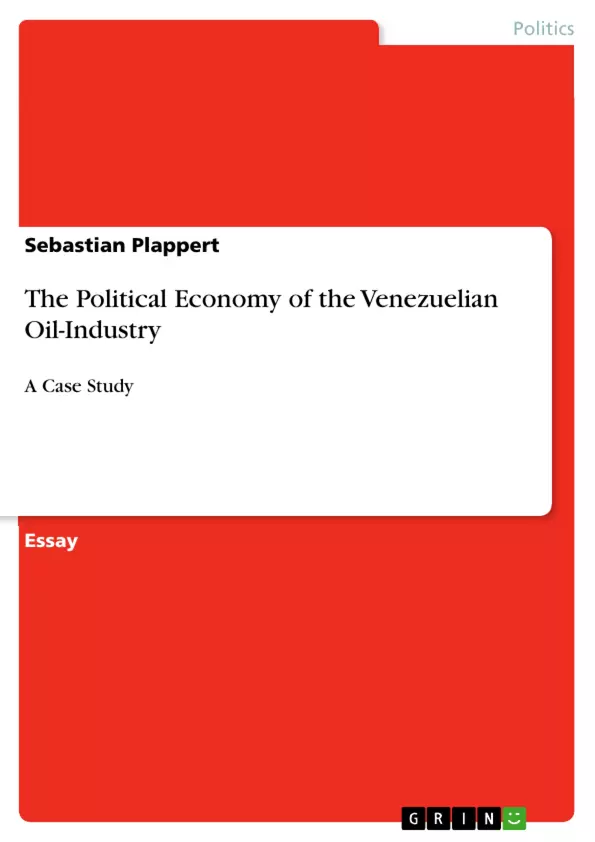This paper will explore and analyse the connections between political
power, the mode of oil production in Venezuela and its implications internationally. Special focus will be put on the changing position of multinational corporations and the role of the state in shaping the
economic framework.
Inhaltsverzeichnis (Table of Contents)
- Oil production and politics
- The neoliberal period
- Chavez’s arrival
- Nationalization and its consequences
- The changing framework
- Venezuela’s rejection of neoliberalism
Zielsetzung und Themenschwerpunkte (Objectives and Key Themes)
This paper explores the complex relationship between political power, the mode of oil production in Venezuela, and its international implications. It analyzes the changing role of multinational corporations and the Venezuelan state in shaping the economic framework, focusing specifically on the nationalization of the oil industry under Hugo Chavez.
- The historical connection between oil production and politics in Venezuela
- The impact of neoliberalism on the Venezuelan oil industry
- The rise of Hugo Chavez and his policies for nationalizing the oil industry
- The implications of nationalization for the economic framework and international relations
- Venezuela’s rejection of neoliberalism and its potential impact on the global economic order
Zusammenfassung der Kapitel (Chapter Summaries)
- This chapter examines the historical relationship between oil production and politics in Venezuela, focusing on the creation of the national oil corporation PDVSA and its subsequent role in the country's economy.
- This chapter explores the impact of neoliberal policies on the Venezuelan oil industry, including the partial privatization of PDVSA and the role of multinational corporations.
- This chapter analyzes the rise of Hugo Chavez and his policies for nationalizing the oil industry, including the reassertion of state control over PDVSA and the introduction of social spending programs.
- This chapter examines the consequences of nationalization for the economic framework, including the changing role of multinational corporations and the impact on foreign investment.
- This chapter discusses Venezuela's rejection of neoliberalism and its potential impact on the global economic order, focusing on the country's efforts to diversify its trading partners and reduce its dependence on the United States.
Schlüsselwörter (Keywords)
This paper explores the political economy of the Venezuelan oil industry, focusing on key themes like state control, nationalization, neoliberalism, multinational corporations, social programs, and the impact on international relations. The analysis draws on research findings from various scholars and institutions, including studies on the BiLieF project.
Frequently Asked Questions
What is the role of PDVSA in the Venezuelan economy?
PDVSA is the national oil corporation and serves as the backbone of the economy, having undergone transitions from state control to partial privatization and back to nationalization.
How did Hugo Chavez change the oil industry in Venezuela?
Chavez reasserted state control over PDVSA, nationalized key assets, and redirected oil revenues into social spending programs for the population.
What were the consequences of oil nationalization for multinational corporations?
The framework for foreign investment changed significantly, leading to a reduced role for multinationals and a shift in how international oil production is managed in the country.
Why did Venezuela reject neoliberalism in its oil policy?
Venezuela aimed to reduce dependence on the United States and global neoliberal structures by diversifying trading partners and using oil as a political tool for social development.
What are the international implications of Venezuela's oil politics?
Venezuela's policies challenge the global economic order and influence international relations through its control over vast energy reserves.
- Quote paper
- Sebastian Plappert (Author), 2007, The Political Economy of the Venezuelian Oil-Industry, Munich, GRIN Verlag, https://www.grin.com/document/154628



